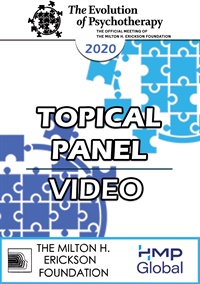
- Average Rating:
- Not yet rated
- Topic Areas:
- Couples Therapy | Family Therapy | Topical Panels | Marriage
- Categories:
- Evolution of Psychotherapy | Evolution of Psychotherapy 2020
- Faculty:
- Harriet Lerner, PhD | John Gottman, PhD | Julie Gottman, PhD | Michele Weiner-Davis, LCSW
- Course Levels:
- Master Degree or Higher in Health-Related Field
- Duration:
- 1 hour 4 minutes
- Format:
- Audio and Video
- Original Program Date:
- Dec 13, 2020
- Short Description:
- The family is a context in which treatment can be facilitated. Marriage has the capability of healing clients from old wounds.
- Price:
-
Sale is $29.00
price reduced from Base Price - $59.00
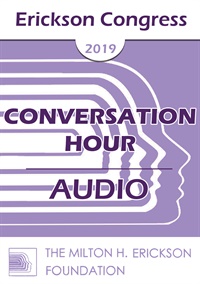
- Average Rating:
- Not yet rated
- Topic Areas:
- Conversation Hours | Eating Disorders | Ericksonian Hypnosis and Therapy Techniques | Anorexia | Family Therapy
- Categories:
- Erickson Congress | Erickson Congress 2019
- Faculty:
- Camillo Loriedo, MD, PhD
- Duration:
- 1 Hour 1 Minutes
- Format:
- Audio Only
- Original Program Date:
- Dec 14, 2019
- Short Description:
- Eating Disorders are a good example of massive interdependence among family members. Salvador Minuchin described families with Anorexia Nervosa as enmeshed families, and the interdependence it is certainly the base for enmeshment. Recent studies as well as more extended clinical experiences demonstrate that although bulimia appears to produce less reciprocal involvement, and some other form of apparent disengagement, we really can say that reciprocal interdependence in the family it always present, even if it assumes more hidden and complex forms.
- Price:
- $15.00 - Base Price
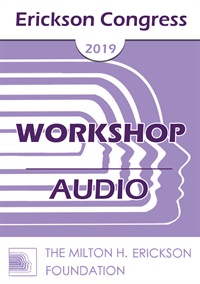
- Average Rating:
- Not yet rated
- Topic Areas:
- Workshops | Autism | Hypnosis | Children and Adolescent Therapy | Family Therapy | Communication
- Categories:
- Erickson Congress | Erickson Congress 2019
- Faculty:
- Laurence Sugarman, MD
- Duration:
- 1 Hour 38 Minutes
- Format:
- Audio Only
- Original Program Date:
- Dec 13, 2019
- Short Description:
- Hypnotic conversations explore, evoke, engage and reallocate and experiential resources. Having hypnotic conversations with young people who meet criteria for autism spectrum disorder (ASD), presents challenges both in relating and accessing resources. The challenge extends to helping their parents to better parent by seeing them as resourceful and capable.
- Price:
- $15.00 - Base Price
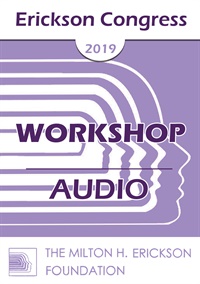
- Average Rating:
- Not yet rated
- Topic Areas:
- Workshops | Anxiety | Family Therapy | Homework | Children and Adolescent Therapy | Experiential Therapy
- Categories:
- Erickson Congress | Erickson Congress 2019
- Faculty:
- Lynn Lyons, LICSW
- Duration:
- 1 Hour 56 Minutes
- Format:
- Audio Only
- Original Program Date:
- Dec 13, 2019
- Short Description:
- After decades of working with anxious children and teens, I have two unshakable truths: families MUST be involved in treatment and anxious patterns are shifted through experiential learning. Working with the FOUR critical concepts to manage anxiety in families and the SIX patterns that must be interrupted, this workshop will describe HOW to create active, engaging assignments for families to do between sessions and describe the TEN favorites that I return to again and again.
- Price:
- $15.00 - Base Price

- Average Rating:
- Not yet rated
- Topic Areas:
- Short Courses | Hypnotherapy | Aging and Mortality | Communication | Family Therapy
- Categories:
- Erickson Congress | Erickson Congress 2019
- Faculty:
- Stefan Hammel, MTh
- Duration:
- 1 Hour 29 Minutes
- Format:
- Audio Only
- Original Program Date:
- Dec 12, 2019
- Short Description:
- What can we do for dying people and their families in addition to palliative care? What is helpful to communicate during the last hours of life? In this workshop we bring integrate the millennium-old pictorial traditions of religion with techniques of hypnotherapy including pacing and leading, utilizing metaphors, and the evocation of values and convictions of dying patients with their families.
- Price:
- $15.00 - Base Price
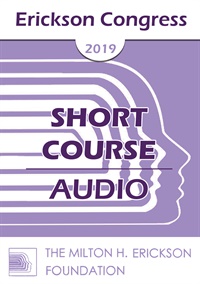
- Average Rating:
- Not yet rated
- Topic Areas:
- Short Courses | Children and Adolescent Therapy | Ericksonian Psychotherapy | Psychotherapy | Ericksonian Hypnosis and Therapy Techniques | Family Therapy
- Categories:
- Erickson Congress | Erickson Congress 2019
- Faculty:
- Maria Escalante de Smith, MA
- Duration:
- 1 Hour
- Format:
- Audio Only
- Original Program Date:
- Dec 12, 2019
- Short Description:
- Ericksonian Psychotherapy emphasizes the importance of utilization. When treating children, as therapists, we need to keep in mind that we also need to utilize whatever happens during therapy whether that can be a given behavior, if the child brings a toy for the consultation, their likes and also provide them with a wide array of resources they can access during therapy.
- Price:
- $15.00 - Base Price
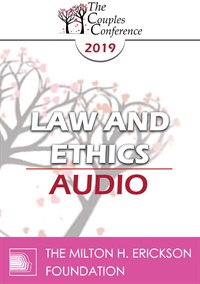
Credit available - Click Here for more information
- Average Rating:
- Not yet rated
- Topic Areas:
- Law & Ethics | Continuing Education | Couples Therapy | Family Therapy | Therapist Development
- Bundle:
- CC19 Main Conference Audio Bundle
- Categories:
- Couples Conference | Couples Conference 2019 | Online Continuing Education
- Faculty:
- A. Steven Frankel, PhD, JD, ABPP
- Duration:
- 2:59:37
- Format:
- Audio Only
- Original Program Date:
- Apr 11, 2019
- Short Description:
- This six-hour program seeks to provide information and recommendations for mental health professionals whose work includes the assessment and treatment of couples and families. The program begins with an update on legal and ethical developments that affect providers, and then moves to a discussion of risk management strategies for clinicians, including the most critical issues faced by clinicians in their work.
- Price:
- $15.00 - Base Price
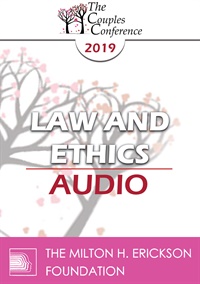
Credit available - Click Here for more information
- Average Rating:
- Not yet rated
- Topic Areas:
- Law & Ethics | Continuing Education | Couples Therapy | Family Therapy | Therapist Development
- Bundle:
- CC19 Main Conference Audio Bundle
- Categories:
- Couples Conference | Couples Conference 2019 | Online Continuing Education
- Faculty:
- A. Steven Frankel, PhD, JD, ABPP
- Duration:
- 2:01:41
- Format:
- Audio Only
- Original Program Date:
- Apr 11, 2019
- Short Description:
- This six-hour program seeks to provide information and recommendations for mental health professionals whose work includes the assessment and treatment of couples and families. The program begins with an update on legal and ethical developments that affect providers, and then moves to a discussion of risk management strategies for clinicians, including the most critical issues faced by clinicians in their work.
- Price:
- $15.00 - Base Price
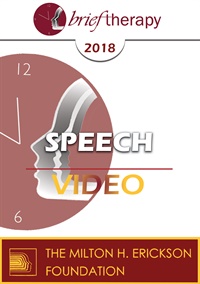
Credit available - Click Here for more information
- Average Rating:
- Not yet rated
- Topic Areas:
- Speeches | Children and Adolescent Therapy | Art and Creativity | Brief Therapy | Family Therapy | Anxiety | Depression | Goals of the Therapist
- Categories:
- Brief Therapy Conference | Brief Therapy Conference 2018 | Online Continuing Education
- Faculty:
- Lynn Lyons, LICSW
- Course Levels:
- Master Degree or Higher in Health-Related Field
- Duration:
- 1:02:45
- Format:
- Audio and Video
- Original Program Date:
- Dec 09, 2018
- Short Description:
- We don't often think of creativity and problem solving as equal partners in therapy with children. But when struggling families arrive at your office, it is the immediate blending of these two components that allows you and the family to move quickly from overwhelmed to engaged, confused to targeted. Based on 29 years of successes and failures, this speech will offer ideas to immediately connect with families, help them untangle the tired messiness they often arrive with, and create active interventions that build momentum, create new patterns, and offer hope.
- Price:
-
Sale is $29.00
price reduced from Base Price - $59.00
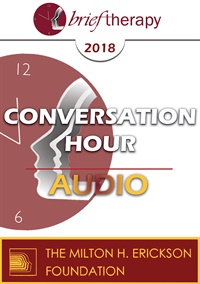
- Average Rating:
- Not yet rated
- Topic Areas:
- Great Conversations | Children and Adolescent Therapy | Family Therapy | Trauma | Brief Therapy | Post-Traumatic Stress Disorder (PTSD)
- Categories:
- Brief Therapy Conference | Brief Therapy Conference 2018
- Faculty:
- Camillo Loriedo, MD, PhD | Lynn Lyons, LICSW
- Duration:
- 1:00:58
- Format:
- Audio Only
- Original Program Date:
- Dec 08, 2018
- Short Description:
- Trauma does not only affect individuals; it effects families. Systemic perspectives on the sequel to trauma will be presented.
- Price:
- $15.00 - Base Price
Please wait ...

